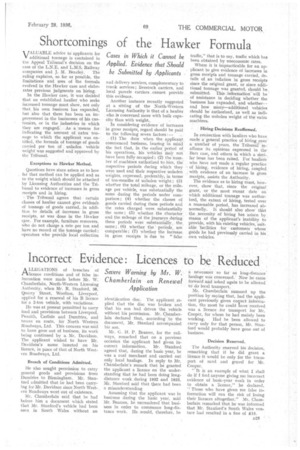Incorrect Evidence: Licences to be Reduced
Page 39

If you've noticed an error in this article please click here to report it so we can fix it.
ALLEGATIONS of breaches of licence conditions and of false information were made before Mr. W. Chamberlain, North-Western Licensing Authority, when Mr. R. Stanford, 38, Quarry Street, Woolton, Liverpool, applied for a renewal of his B licence for a 2-ton vehicle, with variations:
He was at present permitted to carry food and provisions between Liverpool, Penrith, Carlisle and Dumfries, and towns en route, for North Western Roadways, Ltd. This concern was said to have gone out of business, its work being continued by a Mr. Davidson. The applicant wished to have Mr. Davidson's name inserted on his licence, in place of that of North Western Roadways, Ltd.
Breach of Conditions Admitted.
He also sought permission to carry general goods and provisions from Dumfries to Birmingham. Mr. Stanford admitted that he had been carrying for Mr. Davidson since North West, crn Roadways went out of existence.
Mr. Chamberlain said that he had before him a document which stated that Mr. Stanford's vehicle had been seen in South Wales without an
identification disc. The applicant. replied that the disc was broken and that his son had driven the vehicle without his permission. Mr. Chamberlain declared that, according to the document, Mr. Stanford accompanied his son.
Mr. G. H. P. Beames, for the railways, remarked that on a previous occasion the applicant had given incorrect information, Mr. Stanford agreed that, during the basic year, he was a coal merchant and carried out only local haulage. In reply to Mr. Chamberlain's remark that he granted the applicant a licence on the understanding that he had been doing longdistance work during 1932 and 1933, Mr. Stanford said that there had been a misunderstanding Assuming that the applicant was in business during the basic year, said Mr. Beanies, he surrendered that business in order to commence long-distance work. He would, therefore, be
a newcomer so far as king-distance haulage was concerned. Nerve he cattle forward and *asked again to be allowed. th' dolocal transport.
Mr. Chamberlain summed up the position by saying that, had the applicant previously given correct informas tion, the most he could tave received. was a licence . for transport for Mr. Cooper, for whom he had mainly been working. Had he been allowed to carry only for that person, Mr. Stanford would probably have gone out of business.
Decision Reserved.
The Authority reserved his decision, remarking that if he did grant a licence it would he only for the transport of sand and gravel for Mr. Cooper.
" It is an example of what I shall do if I find anyone giving me incorrect evidence of basic-year work in order to obtain a licence," he declared. " Those who have given me false information will run the risk of losing their licences altogether." Mr. Chamberlain remarked that he was informed that Mr. Stanford's South Wales venture had resulted in a fine of £15.




























































































